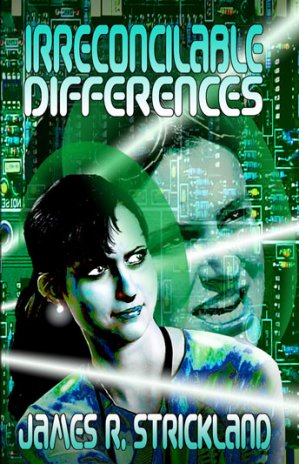 One reason I like Jim Strickland's fiction is that I like the way he thinks. He and I look at the future and draw a lot of the same conclusions. I understand his logic, and that helps me appreciate the stories he tells, even if I myself would not tell them in anything like the same way. Being able to toss ideas around with him in person helps a lot; we workshop together, and I've learned quite a bit watching him hone his style.
One reason I like Jim Strickland's fiction is that I like the way he thinks. He and I look at the future and draw a lot of the same conclusions. I understand his logic, and that helps me appreciate the stories he tells, even if I myself would not tell them in anything like the same way. Being able to toss ideas around with him in person helps a lot; we workshop together, and I've learned quite a bit watching him hone his style.
So we come to Irreconcilable Differences, which was released at the publisher's frontlist party at Denvention a few weeks ago. As with his first novel, Looking Glass, we have a police mission in a now+20 near future in which the world has boiled over but not burned. The US has split into several pieces along tribal lines, and various interests are trying to bring the world into a new equilibrium. Chief of these is Interpol Covert Services, which is paying particular attention to activities on the Internet. As a means of cracking a particularly difficult case, Interpol has gone deep bleeding edge and uploaded the mind and memories of one of their toughest agents into a 16-year-old hacker girl who got caught, and agreed to the mission as part of a plea bargain. The agent is Rachel Santana, who's lived a little too much; the girl is Micki Blake, who has barely lived at all. The two coexist in a single body, Micki in her own brain, Rae in a block of high-performance synthetic nerve tissue inserted surgically. They communicate internally through a sort of VR boundary zone called the gestalt, which is more than conversation but not quite telepathy. With Rae on board directing the show, Micki returns to her small-town hacker group, a little bleary but suspecting that she's not in Kansas anymore.
Except that she is. Micki is a Kansas farm girl (from a farm that harvests the wind as much as meat and grain) and the action is out on (and under) the Kansas plains. Micki/Rae ride with the rest of their gang along dirt roads in a ramshackle Winnebago RV full of state-of-the-art networking gear stuffed in a closet, ducking in and out of the Net as needs require. The rest of the story is nonstop action taking place at several levels, with some diabolical twists and turns that I'll leave for you to discover.
Where we may also not quite be anymore is cyberpunk, even though that's how Jim characterizes the novel. There's lots of exhaustively researched cyber here, but very little punk. The American culture of the plains has mutated in some ways, but it's not the oh-so-precious Gibsonian San Francisco noir that always makes me giggle a little when I read it. Kids still ride on school buses and go to dances—and now help one another keep the family wind-turbines turning. The rural character of the future is an intuition I had 20 years ago: Once the Net genuinely fuzzes out the idea of physical location, the real action will be where the food and the energy come from. Cities produce nothing but proximity—and once proximity ceases to be a core value, life on Earth will change radically, especially if even minor cold wars heat up a little. Maybe a better word would be “cyberbilly.” I think of it that way; the heartland has more head than the headland will ever have the heart to admit.
One of the few downsides to the novel is that it's too short to give us as much flavor for this future world as I'd prefer. Jim has rightfully emphasized the questions of what it's really like to be a copy of a human being—something most cyberpunkers and transhumanists take for granted and never think too deeply about. Rae's struggles with this issue of self are mirrored in Micki's struggles to appreciate the self that she has, and the two are inadvertent agents in one another's healing processes. The story is a personal one, intense and immediate. Another 50,000 words would have fleshed it out, but also slowed it down. It's a conundrum that every good writer has to confront eventually. I think Jim made the right choice here. He will have future novels in which to develop the world as a whole, and I'm patient enough to wait for them.
Jim gets extra points for appending a glossary to the end of the novel, summarizing the technological and cultural ideas he's presented through the story, along with quick brushups on networking terms. You may need it; this is one of the most unabashedly technical novels I've seen in a long time, and for a hard SF guy like me, well, that's simply delicious.
In short, highly recommended.










